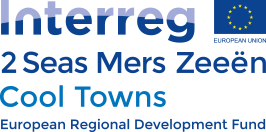Cool Towns European Union Funding
About this project
- Value of EU grant - €407,821.05
- Name of funding programme - Interreg 2 Seas Programme 2014-2020
- Start and end dates - September 2018 to September 2022.
The Cool Towns project is for the spatial adaptation for heat resilience in small and medium sized cities in the 2 seas region. It aims to help urban areas in England, the Netherlands, Belgium and France minimise the heat-related effects of climate change by:
- improving the understanding of overheating risk and effective heat management in urban areas
- increasing awareness and use of green and blue infrastructure to reduce heat stress through urban design
- demonstrating effective heat resilience through pilot investments
For more information about the project visit:
Partners
- Gemeente Middelburg (Netherlands)
- Gemeente Breda (Netherlands)
- Provincie Oost-Vlaanderen (Belgium)
- Stad Oostende (Belgium)
- Southend on Sea Borough Council (SBC) (United Kingdom)
- University of Greenwich (United Kingdom)
- Université Picardie Jules Verne (UPJV) (France)
- GreenBlue Urban (United Kingdom)
- AUD Agence d'Urbanisme et de Développement de la Région de Saint-Omer et Flandre Interieure (France)
- Hogeschool van Amsterdam (Netherlands)
- Sioen Industries (Belgium)
- Communauté d’agglomération du Pays de Saint Omer (France).
Observer partners
- Provincie Zeeland (Netherlands)
- Waterschap Scheldestromen (Netherlands)
- Provincie Noord-Brabant (Netherlands)
- Waterschap Brabantse Delta (Netherlands)
- Gemeenschappelijke Gezondheidsdienst Zeeland (Netherlands)
- Stad Brugge (Belgium)
- Vlaamse Milieumaatschappij (Belgium)
- Vlaamse Instelling voor Technologisch Onderzoek (Belgium)
- Stad Mechelen (Belgium)
- BSGO! De Reigers (Belgium)
- Gemeentebestuur Merelbeke (Belgium)
- Université de Lille (France)
- Centre Ressource du Développement Durable (France)
- NKWK Onderzoeksprogramma Klimaatbestendige Stad (Netherlands)
- Stadsbestuur Eeklo (Belgium)
- Proefcentrum voor de Sierteelt (Belgium).
Aims and objectives
- Test and implement effective green and blue infrastructure to manage overheating risk in urban areas
- Increase capacity of planning authorities, private and third sector organisations and the public to integrate heat stress reduction measures in urban design
- Embed heat resilience in climate adaptation, spatial development, regeneration and growth strategies.
Anticipated outcomes
- Increase in resilience to heat stress in urban areas
- Develop new tools to map heat stress and identify effective measures to reduce overheating risk
- Test the ease and effectiveness of implementing heat reduction measures in urban design.
Key benefits for Kent
- Build adaptation capacity to heat stress in urban areas in the county
- Improve the ability to ensure quality of life in urban environments, both now and in the future
- Increase public health and well-being outcomes by supporting delivery of nature-based design and resilience in Kent to minimise the impact of overheating.
